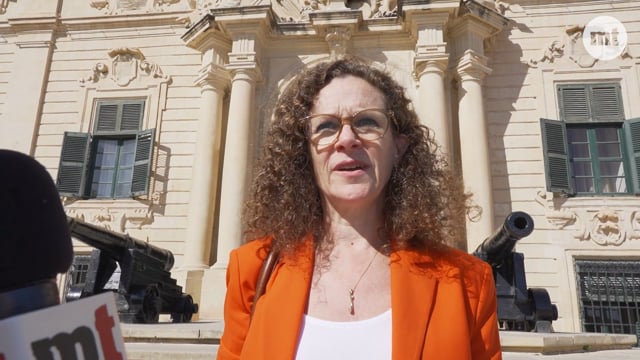[WATCH] MEPs highlight Malta’s slow judicial process during meeting with Prime Minister
The MEPs met Prime Minister Robert Abela at Castille on Tuesday afternoon as part of a fact-finding mission on Malta's rule-of-law progress


Updated at 5:34pm with LIBE committee chair comments after meeting with PM
Members of the European Parliament’s civil liberties committee noted that Malta’s slow judicial process was still of concern during a meeting with Prime Minister Robert Abela on Tuesday afternoon.
Abela hosted the delegation at Castille with other key members of his Cabinet. The MEPs are in Malta as part of a fact-finding mission on Malta's rule-of-law progress after the murder of Daphne Caruana Galizia.
Speaking to MaltaToday after the two-hour meeting, Sophie Int’Veldt, chairwoman of the Rule of Law Monitoring Group within the LIBE committee said MEPs have seen progress but also had points of concern.
She said that the length of judicial procedures and lack of judicial capacity was a main concern but was also recognised by government. "We feel these concerns need to be urgently addressed," she said.
Int'Veldt spoke positively of the reforms in the way judges and magistrates are now appointed, saying this was "an important reform".
However, she said the committee still had other meetings scheduled and said a more complete reaction would be delivered tomorrow.
Earlier, in opening comments before the meeting, Abela mentioned the new Cabinet and strong mandate that his administration was given by the electorate to continue enacting reforms. He said that several MPs who were elected for the first time in the March election were instantly given a cabinet position.
“They are representative of the new Cabinet – elected for the first time and instantly given a portfolio,” Abela said.
He said the priority of his administration since January 2020 has been rule of law. Abela spoke of reforms in the appointments of the judiciary, the chief justice and the police commissioner, saying that his government enacted all of the Venice Commission recommendations.
He added that the role of the Attorney General and the State Advocate had been separated, as per the recommendations of the Venice Commission.
“The country then had a second challenge. The Moneyval report spoke of deficiencies in anti-money laundering and countering terrorist financing structures. The report was damning,” Abela told the LIBE committee, saying that the government managed to address the report with success.

With regards to the Malta's greylisting from Financial Action Task Force, the PM said Malta was given the shortest action plan, adding that he was looking forward to a positive outcome, given that Malta substantially completed its action plan by last March.
Abela said that after the public inquiry into the murder of Daphne Caruana Galizia was concluded, a committee of media experts was set up to address a number of bills, including anti-SLAPP reforms.
He said that the pandemic was a priority in November, during the last visit by the committee, but he emphasised that it had now shifted onto the war between Russian and Ukraine. He said that the government had to protect citizens from inflation.
“It is easy to put the challenges of rule of law on the side. The temptation might be to put it on the back burner, but the rule of law must remain a priority. It is a catalyst,” Abela concluded.
“The reforms were many and in my opinion we brought about a change in attitude and culture. A robust rule of law attracts investment to the country,” Abela said.
In her introductory remarks, Int’Veldt said that ever since Daphne Caruana Galizia was murdered, the situation in Malta was closely monitored.
“The rule of law is high on everybody’s agenda and it is conditional for receiving EU funds,” she said.
She emphasised that the committee had more questions to ask, even though she acknowledged that changes had been implemented.
Right before the media was asked out of the room, for the meeting to continue behind closed doors, Int’Veldt spoke of the slow judicial processes in Malta, saying this was of concern.

.png)



















